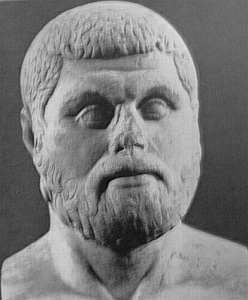A City Without Buildings: Themistocles Before Salamis May 13, 2015
Author: Beach Combing | in : Ancient , trackbackA WIBT (Wish I’d Been There) episode from the wars between Greece and Persia in 480/479. The Athenians, save some brave warriors who attempted to defend, futilely the Acropolis, have fled from their city. The unstoppable Persian army has fired the temples and the holy places of Athena: and the Persian fleet has moved down to stand against Attica. With Athens smouldering on the horizon the leaders of the Hellenic League, the allied Greek cities against the Persians, comes together to decide its strategy. Should the Greeks bow their necks to the invaders, should they fight and if so where, or should they flee to the ends of the earth? Themistocles, the much maligned but always cunning leader of the Athenians speaks and he demands war: his successful advocacy will lead, the next day, to the ‘wooden wall’ of Salamis when the Greeks payed back the Persians for their invasion; early in 479 the Greeks would pay the Persian army in similar coin at happy Plataea. However, the more reluctant Greeks are, for now, having nothing of it. Adeimantus, the leader of the Corinthian contingent had threatened to sail away previously, not least before the battle of Artemesium, a scrappy and ultimately unhappy encounter for the Greeks with the massive Persian navy some weeks before. At his most obnoxious, though doubtless much provoked, by the always difficult Themistocles, Adeimantus speaks with spite to the assembly. Themistocles, he points out, no longer had a country: perhaps as he said this he waved to the burning buildings on the hills behind him.
Hereupon Themistocles spake many bitter things against Adeimantus and the Corinthians generally; and for proof that he had a country, reminded the captains, that with two hundred ships at his command, all fully manned for battle, he had both city and territory as good as theirs; since there was no Grecian state which could resist his men if they were to make a descent.
It is in many ways just another insult thrown from polis leader to polis leader, but here for the first time in history is recorded the notion that a city is not buildings and streets, but citizens and will: any other ancient examples drbeachcombing AT yahoo DOT com. Sixth-century Athens had grown strong and democratic on this intuition (see Cleisthenes and his successors). The Spartans would defeat, ultimately, Athens, in a later war, because Athenians forgot the same.



